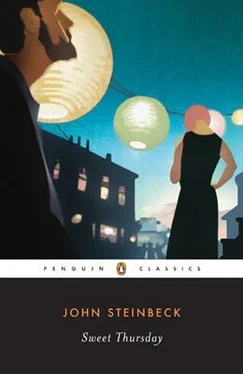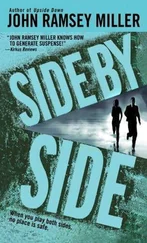John Steinbeck - Sweet Thursday
Здесь есть возможность читать онлайн «John Steinbeck - Sweet Thursday» весь текст электронной книги совершенно бесплатно (целиком полную версию без сокращений). В некоторых случаях можно слушать аудио, скачать через торрент в формате fb2 и присутствует краткое содержание. Год выпуска: 2008, ISBN: 2008, Издательство: Penguin Classics, Жанр: Классическая проза, на английском языке. Описание произведения, (предисловие) а так же отзывы посетителей доступны на портале библиотеки ЛибКат.
- Название:Sweet Thursday
- Автор:
- Издательство:Penguin Classics
- Жанр:
- Год:2008
- ISBN:1-4362-4126-X
- Рейтинг книги:5 / 5. Голосов: 1
-
Избранное:Добавить в избранное
- Отзывы:
-
Ваша оценка:
- 100
- 1
- 2
- 3
- 4
- 5
Sweet Thursday: краткое содержание, описание и аннотация
Предлагаем к чтению аннотацию, описание, краткое содержание или предисловие (зависит от того, что написал сам автор книги «Sweet Thursday»). Если вы не нашли необходимую информацию о книге — напишите в комментариях, мы постараемся отыскать её.
Cannery Row
Sweet Thursday — читать онлайн бесплатно полную книгу (весь текст) целиком
Ниже представлен текст книги, разбитый по страницам. Система сохранения места последней прочитанной страницы, позволяет с удобством читать онлайн бесплатно книгу «Sweet Thursday», без необходимости каждый раз заново искать на чём Вы остановились. Поставьте закладку, и сможете в любой момент перейти на страницу, на которой закончили чтение.
Интервал:
Закладка:
In the fields of larceny and fraud Joseph and Mary vegetated for a number of years. He was a man when the fog cleared from before his eyes and he could see again. Then just when he was set to go, the Army got him and kept him as long as it could in good conscience. It is said that his final dishonorable discharge is a masterpiece of understatement.
J and M never could get set. He started again on his career and took a wrong turning, for he fell under the influence of a young and understanding priest, who drew him into the warm bosom of Mother Church, into which Joseph and Mary had been born anyway. Now Joseph and Mary Rivas approved of confession and forgiveness, and he felt, as perhaps François Villon [21] François Villon: French poet, thief, and general vagabond (ca. 1431–ca. 1474).
had, that under the protection of the cloth he might find some outlet for his talent. Father Murphy taught him the theory of honest labor, and when Joseph and Mary had got over the shock of the principle he decided to give it a try. He was still malleable, and he succeeded, where Villon had failed, in keeping his hands off church property. With the help of Father Murphy, who had influence in the city government, Joseph and Mary found himself the possessor of a city job, a position of dignity, with a monthly check to be cashed without fear of fingerprinting.
The Plaza in Los Angeles is a pretty square, ornamented with small gardens, palms in great pots, and many, many flowers. It is a landmark, a tourist center, a city pride, for it preserves a Mexican-ness unknown in Mexico. Joseph and Mary, then, was in charge of watering and cultivating the plants in the Plaza—a job that was not only easy and pleasant but kept him in direct touch with those tourists who might be interested in small packets of art studies. Although Joseph and Mary realized he could never get rich in this job, he took a certain pleasure in being partly legal. It gave him the satisfaction most people find in sin.
At about this time the Los Angeles Police Department had a puzzle on its hands. Marijuana was being distributed in fairly large quantities and at a greatly reduced price. The narcotics squad conducted raid after raid without finding the source. Every vacant lot was searched from San Pedro to Eagle Rock. And then the countryside was laid out on graphing paper and the search for the pointed leaves of the marijuana went on in ever-widening circles: north past Santa Barbara; east to the Colorado River; south as far as the border. The border was sealed, and it is well known that muggles [22] muggles: A slang term for marijuana.
does not grow in the Pacific Ocean. Six months of intensive search, with the cooperation of all local officials and the state police, got absolutely nowhere. The supply continued unabated, and the narcotics squad was convinced that the pushers did not know the source.
Heaven knows how long the situation might have continued if it had not been for Mildred Bugle, thirteen, head of her class in Beginning Botany, Los Angeles High School. One Saturday afternoon she crossed the Plaza, picked some interesting leaves growing around a potted palm, and positively identified them as Cannabis Americana.
Joseph and Mary Rivas might have been in trouble but for the fact that the Los Angeles Police Department was in worse trouble. They could not bring him to book. How would it look if the newspapers got hold of the story that the Plaza was the source of supply? that the product had been planted and nurtured by a city employee, freshened with city water, and fed with city manure?
Joseph and Mary was given a floater so strongly worded that it singed his eyelashes. The police even bought him a bus ticket as far as San Luis Obispo.
Doc chuckled. “You know, Mack,” he said, “you’re almost building a case for honesty.”
“I always put in a good word for it,” said Mack.
“How did he get in the wetback [23] wetback: Derogatory name applied to undocumented Mexican immigrants in the United States. The term is thought originally to refer to people crossing the border by swimming across the Rio Grande. Generally, Steinbeck’s use of racially charged terms such as “Chink” and “spick” reflects the attitudes and habits of his characters, not necessarily of the author. His attitude toward Mexican nationals—if not exactly fully realistic or authentic—is nonetheless generally positive and respectful, especially when it is noted that Sweet Thursday appeared during the same year the United States government’s Immigration and Naturalization Service launched Operation Wetback (1954), which targeted illegal Mexican nationals in the southwestern United States and eventually succeeded in deporting eighty thousand of them.
business?” Doc asked.
“Well, he was casing the field for a career,” said Mack, “and wetbacks looked like a gold-brick cinch. Joseph and Mary figured the angles and the percentage. You look at it and you see it couldn’t flop.” He put up his fingers to count facts, then took a quick drink to tide him over the period when his hands would be tied up.
Mack touched the little finger of his left hand with his right forefinger. “Number one,” he said. “J and M talks Mexican because his old man and his old lady was Mexican before they come to L.A.” He touched his third finger. “Number two, the wetbacks come in by theirself. Nobody makes them come. There’s a steady supply. Number three, they can’t talk English and they don’t know a cop from a bucket. They need somebody like Joseph and Mary to take care of them and get them jobs and take their pay. If one of them gets mean, all J and M got to do is call the federal men, and they deport him without no trouble to J and M. That’s what he was always looking for—a racket with the percentage stacked for the house. He figures he’s got three or four crews working in fruit and vegetables and he can kind of lay back and rest, the way he always wanted. That’s why he bought out Lee Chong. He figured to make the grocery a kind of labor center, where he could rest up his men and sell them stuff at the same time. And what he’s doing ain’t very much against the law.”
Doc said, “I can tell, from your tone, it didn’t work. What happened?”
“Music,” said Mack.
Now it is true that Joseph and Mary did know all the angles, averages, and percentages. His systems couldn’t lose, but they did. The odds are against making your point with the dice, and that law holds until magic intervenes and someone makes a run.
There were literally millions of wetbacks in the country—quiet, hard-working, ignorant men, content to bend their backs over the demanding earth. It was a setup; it couldn’t lose. How did it happen, then, that in Joseph and Mary’s crew there should be one tenor and one guitar player? Under his horrified eyes an orchestra took shape—two guitars, a guitarón, rhythm and maraca men, a tenor, and two baritones. He would have had the whole lot deported if his nephew, Cacahuete, had not joined them with his hot trumpet.
Joseph and Mary’s wetbacks abandoned the carrot and cauliflower fields for the dance floors of the little towns in California. They called themselves the Espaldas Mojadas. [24] Espaldas Mojadas: Joseph and Mary’s group is Wetbacks.
They played “Ven a Mi, Mi Chica Dolorosa” and “Mujer de San Luis” and “El Nubito Blanco que Llora.” [25] “Ven a Mi…que Llora”: Spanish song titles: “Come to Me, My Sorrowful Girl,” “Woman from San Luis,” and “The Little White Cloud That Cries.”
The Espaldas Mojadas dressed in tight charro [26] charro: The Spanish word for the colorful, even gaudy, traditional outfit of the Mexican cowboy.
costumes, wore huge Mexican hats, and played for dances in the Spreckel Fireman’s Hall, the Soledad I. O. O. F., [27] I. O. O. F.: In de pen dent Order of Odd Fellows, a fraternal organization devoted to improving and elevating the condition of humanity through friendship, love, and truth. Derived from seventeenth-century British orders, the first American I.O.O.F. lodge was chartered in Baltimore, Mary land, in 1819. In 1851, membership was extended to women.
the Elks of King City, the Greenfield Garage, the San Ardo Municipal Auditorium. Joseph and Mary stopped fighting them and started booking them. Business was so good he screened new wetbacks for talent. It was Joseph and Mary’s first entrance into show business, and its native dishonesty reassured him that his course was well chosen.
Интервал:
Закладка:
Похожие книги на «Sweet Thursday»
Представляем Вашему вниманию похожие книги на «Sweet Thursday» списком для выбора. Мы отобрали схожую по названию и смыслу литературу в надежде предоставить читателям больше вариантов отыскать новые, интересные, ещё непрочитанные произведения.
Обсуждение, отзывы о книге «Sweet Thursday» и просто собственные мнения читателей. Оставьте ваши комментарии, напишите, что Вы думаете о произведении, его смысле или главных героях. Укажите что конкретно понравилось, а что нет, и почему Вы так считаете.










